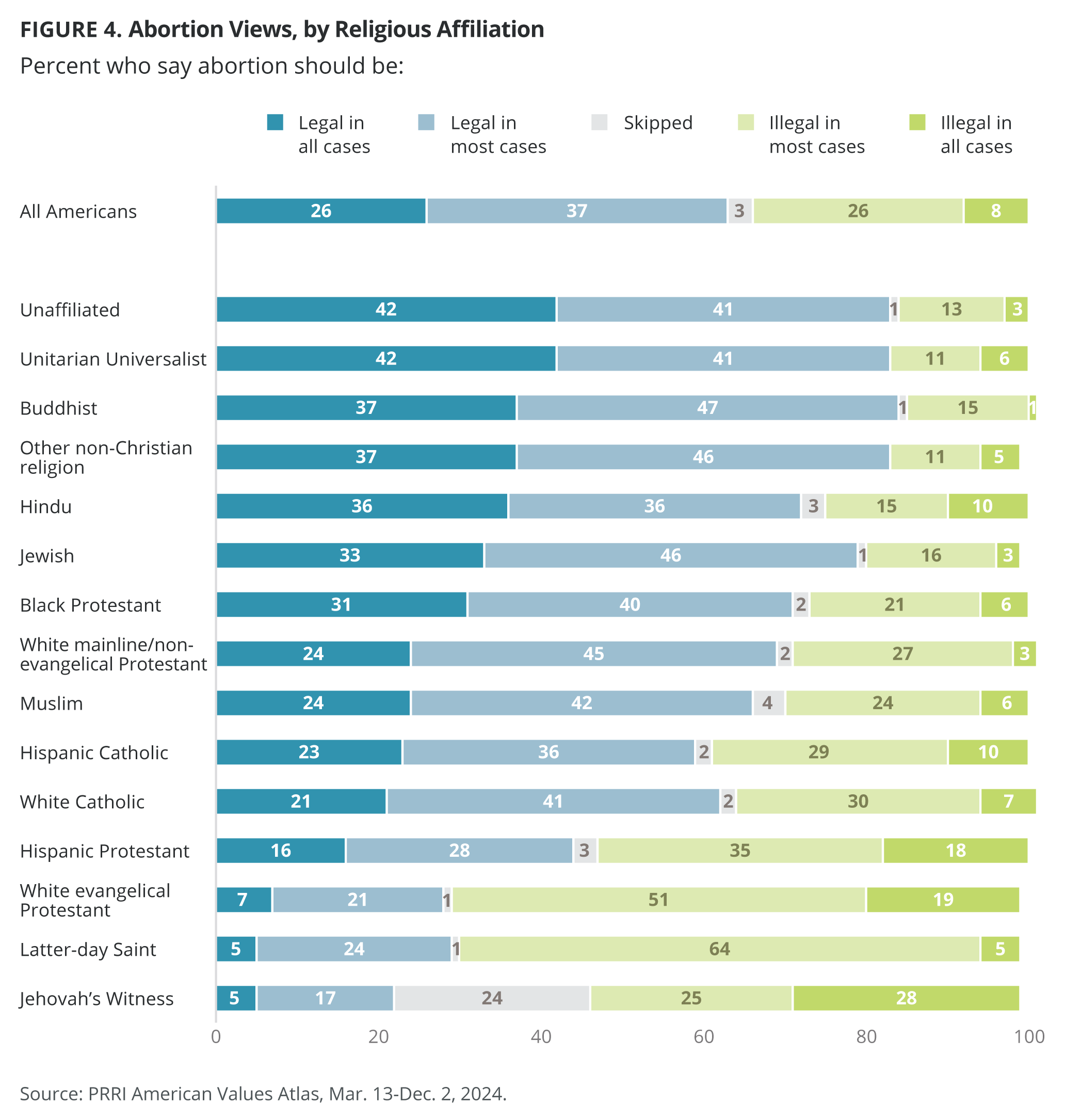Following the release of a new report about Americans’ abortion attitudes featuring data from the 2024 PRRI American Values Atlas, PRRI hosted a panel discussion to examine the survey’s findings.
Along with PRRI Public Fellows, Anne Whitesell, Ph.D., and Michal Raucher, Ph.D., PRRI CEO Melissa Deckman, Ph.D., discussed major takeaways around Americans’ attitudes on abortion legality at the state level and among different religious groups, views towards the abortion pill, and the effects of abortion attitudes on statewide abortion ballot initiatives during the 2024 election.
Notably, Americans have become more broadly supportive of abortion legality over time, with 63% of Americans believing that abortion should be legal in most or all cases in 2024, compared to 55% in 2010, according to the PRRI American Values Atlas.
Whitesell discussed the potential reasoning behind this increase in Americans’ support for abortion legality. “Looking at how there’s increased support among Americans for abortion [legality] regardless of party might be part of an understanding among Americans that just banning abortion or restricting access to abortion doesn’t necessarily solve the underlying causes for why people get abortions.”
Breaking down support for abortion legality by religious affiliation, majorities across most religious traditions, including 71% of Black Protestants and 62% of white Catholics, say abortion should be legal in all or most cases.

Raucher argues that this data challenges the narrative of religious opposition to abortion legality.
“People are shocked [by this data] because so many religious traditions and religious leaders proclaim opposition to abortion, and yet the public feeling about abortion is much different and inconsistent with some of the religious statements, which raises questions about religion, public life, and politics.”
In looking at the religious practices of abortion legality supporters, 14% attend a weekly religious service, 37% pray weekly, 13% read their religious text weekly, and 9% donate to a religious institution weekly.
Raucher reflected, “Those supporting abortion [legality] can’t be described as secular or completely unaffiliated. They are to a significant extent engaged [in religious practices], which again challenges the dichotomy between religion and abortion.”
Additionally, more Americans (68%) are opposed to laws that would make it illegal to access abortion pills by mail than Americans (63%) who support abortion legality.
Raucher theorized that this higher percentage of opposition against criminalizing access to abortion pills may be due to Americans’ lack of understanding of how commonly used the abortion pill is in abortion care.
“If they don’t think abortion medication is that big of a problem, they don’t want the government to be involved. They don’t realize, however, that over 90% of abortions occur in the first trimester, when abortion pills can be used. I think they might have an impression of abortions being more common later in pregnancy because of the ways anti-choice or pro-life groups talk about abortion of fetal life, and the images that are often used.”
Looking at abortion attitudes and the performance of statewide abortion access ballot initiatives in the 2024 election, Whitehall discussed her findings that in states where abortion legality was on the ballot in 2024, “the percentage of people who voted in support of abortion rights was very close to PRRI’s percentage of people who support abortion rights in those states.” She noted, however, that in many cases, the abortion ballot initiatives outperformed Vice President Harris.
However, the difference in voting in a midterm election versus a general election can impact the success of statewide abortion initiatives. Deckman explained, “One irony of having these statewide referenda appear on the ballot [in 2024] is that maybe it sent the signal to some people, ‘I can vote my choice on reproductive rights, but then I can still make a different choice for president.’”
View the full event recording here and check out Abortion Views Across All 50 States: Key Insights from PRRI’s 2024 American Values Atlas.
Slides presented during the webinar are available here.








